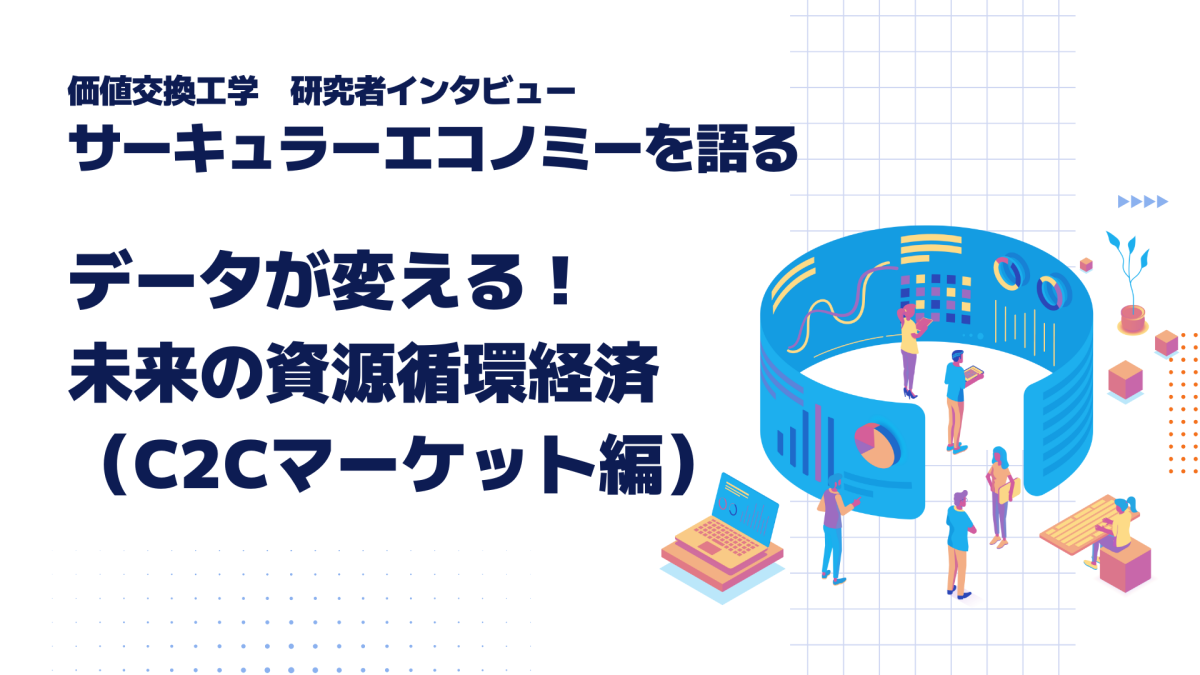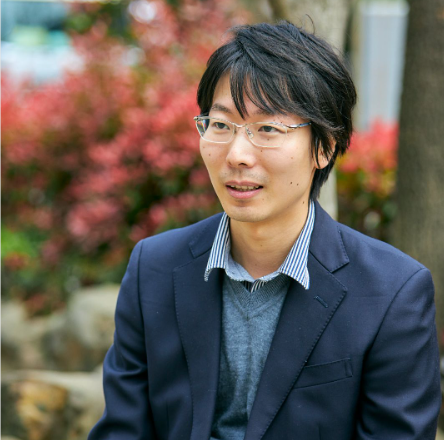
価値交換工学では、サーキュラーエコノミーを注力領域の一つとして掲げ、複数の研究者がさまざまな視点から研究を進めています。
前編に続き、『製品循環とデータ流通の融合による新たな循環システムの創成』について、今回は共同研究先であるメルカリに焦点をあてたお話を早矢仕晃章特任講師に伺いました。
——————————————————————————————————————–

名前:早矢仕晃章
所属:大学院工学系研究科システム創成学専攻・講師
専門:データ科学
実績:異分野を横断したデータ流通の連携研究と技術開発に従事。船井情報科学振興財団研究奨励賞受賞、データ社会推進厚労賞など
——————————————————————————————————————–
宮平(以下――)メルカリと資源循環。一見想像できますが、実際は奥が深そうですね。ではまずお聞きしたいのですが、資源循環や循環型社会の観点でいうと、メルカリのどのようなデータに注目しているのでしょうか?
早矢仕氏(以下、早矢仕):メルカリのようなプラットフォームは、実に様々なデータが取得可能ですが、例えば以下のようなデータを資源循環や循環型社会の実現に役立てることができる可能性があるかと思います。
- 取引履歴:出品された商品の取引履歴を分析することで、取引相手の信頼度が分かれば、消費者がより安心してリユース品を購入できる仕組みを作ることができるでしょう。実際、既に多くの取り組みを実施されていると伺っています。
- 行動データ:ユーザーの行動データを活用することで、製品の適切な価格帯や使用状況が明らかとなり、適切な価格設定やサステナブルな購買行動を促すインセンティブを設計できる可能性があると思います。
- 商品の利用履歴(商品の状態):現状は主観的な判断に基づいていますが、これを正確に取得し、データにすることができれば、製品をより適正な価格で売買することが可能になるかもしれません。
――メルカリのようなプラットフォーマーがデータを使って循環型社会のためにできることには、何があるとお考えですか?
早矢仕:これには2つの観点が考えられると思います。
まず一つは、上述のようにメルカリが自社にあるデータを活用し、サステナビリティを高める施策に繋げるという観点です。メルカリの取引データを活用すれば、企業や自治体は消費者のリユース行動を分析し、環境負荷低減の施策をより効果的に設計できる可能性が高まります。例えば、製品が廃棄される前に適切な再利用ルートに乗せる仕組みや、地域ごとのリユース促進施策の立案にも、メルカリで集められているデータは有益だと思います。
二つめは、メルカリが自社で収集している出品情報やユーザー行動のデータを外部と共有することで、第三者を巻き込んでサステナビリティを高めるということも面白いと思います。つまり、メルカリがデータ販売事業に進出するということです。現在、いくつかのデータは学術利用のために提供されていますが、ビジネス利用のためのデータ提供はそこまで進んでいないという認識です。二次流通市場の詳細なデータは、研究機関だけでなく、様々な企業にとって貴重な情報源となるポテンシャルを有しています。例えば、リユース市場の需要や価格変動の分析に活用すれば、メーカーや小売業者は新品市場の動向と比較して適切な生産・在庫管理が可能になります。また、リユース市場の傾向が把握できれば、企業はより耐久性の高い製品設計や、リファービッシュ(メーカーによる認定整備済製品)事業の拡大を検討しやすくなるかもしれません。
――メルカリのプラットフォームをデータ流通の観点からみるとどうでしょうか?
早矢仕:これは私の研究の関心からのコメントになりますが、メルカリが第三者データを販売するプラットフォーマーになるというアイデアも考えられます。現在、私の研究テーマの一つに「データ流通市場の活性化」というものがあります。ここでは、データの流通が物流と同じように社会インフラとして機能する世界の実現を目指しています。メルカリはすでにモノの売買を支えるプラットフォームとして確立されていますが、同様にデータの売買を仲介する場として発展する可能性もあるでしょう。
つまり、メルカリがデータ提供者とデータ利用者をつなぐプラットフォームとなり、必要なデータを対価と引き換えに誰もが入手できる仕組みを構築する、というアイデアです。私自身、データ流通の取引ルールやマッチングの研究を進めており、こうした視点からもメルカリのプラットフォームが持つポテンシャルには非常に親和性を感じています。データ流通を促進し、社会全体の知の共有を加速させることで、新たなビジネスの創出や、より効率的な資源活用につながるのではないかと考えています。
――今後の取り組みについて、教えてください
早矢仕:サーキュラーエコノミーにおけるデータと資源の循環研究として、データを流通・活用した資源循環モデルの実証研究を進めていく予定です。特に、製造業やリサイクル業界、二次流通を支えるプラットフォーマーとの密な連携を通して、データがどのように資源循環に影響を与えるのかをシミュレーションを用いて検証したいと考えています。また、このような仕組みを支えるためのデータの品質やトレーサビリティ、データの探索を向上させるための技術開発にも注力し、より信頼性の高いデータエコシステムの実現に貢献していきたいと思っています。
――最後に、早矢仕さんのサーキュラーエコノミー実現への夢を教えてください。
早矢仕:私の研究の究極の目的は、「データ流通が物流と同じく社会インフラとなり、欲しいデータを対価を支払うことで誰でも入手可能な世界を実現する」ことです。そのためには、単にデータの流通インフラを整備するだけでは不十分であり、データと資源が相互に影響を与えながら進化する仕組みを構築することが不可欠だと考えています。現状では、資源のリユースやデータ流通の仕組みはまだ不完全であり、最適な循環が実現されているとは言えません。解決すべき課題や乗り越えなければならないハードルは多くありますが、来たる真の循環経済の実現に向けて、アイデアや技術、そして心の準備は十分に整ってきたと確信しています。アクションを起こすなら、今なのではないでしょうか。
データがモノの行き交いだけでなく、社会の仕組みそのものを変える。データによって資源が賢く使われ、新しいビジネスが次々と生まれる。そんな未来の資源循環経済の可能性がまた一つみえたインタビューになりました。早矢仕さん、ありがとうございました!
インタビュー前編はこちら:「サーキュラーエコノミーを語る」~データが変える!未来の資源循環経済~(基礎編)|News|RIISE|東京大学
Talking Circular Economy- Data Transforms! The Future of the Circular Economy (C2C Marketplace Edition)
Value Exchange Engineering has identified the circular economy as one of its key focus areas, with multiple researchers advancing studies from various perspectives.
Continuing from the previous installment on “Creating a New Circular System through the Fusion of Product Circulation and Data Distribution,” this time we interviewed Lecturer Teruaki Hayashi, focusing on Mercari, a joint research partner.
——————————————————————————————————————–

Name: Teruaki Hayashi
Affiliation: Department of Systems Innovation, Graduate School of Engineering, The University of Tokyo / Lecturer
Expertise: Data Science
Achievements: Engaged in collaborative research and technology development for cross-disciplinary data distribution. Recipient of the Funai Foundation for Information Technology Encouragement Prize, and the Data Society Promotion Contributor Award, etc,.
——————————————————————————————————————–
Miyahira (–): Mercari and resource circulation. At first it seems imaginable, but it seems to be very deep as well. First, I’d like to ask, what kind of Mercari data are you focusing on from the perspective of resource circulation and a circular society?
Hayashi: Platforms like Mercari can acquire a vast variety of data. For example, the following types of data can be useful for realizing resource circulation and a circular society:
- Transaction History: Analyzing the transaction history of items listed for sale can help determine the reliability of the trading partner, which could create a system where consumers can purchase used goods with greater confidence. I understand that many initiatives are already underway in this area.
- Behavioral Data: Utilizing user behavior data can clarify appropriate price ranges and usage conditions of products, potentially enabling the design of incentives that promote appropriate pricing and sustainable purchasing behavior.
- Usage History of the Item (Condition of the item): Currently based on subjective judgment but if this can be acquired more accurately and make it to data, it may become possible to trade products at more appropriate prices.
– What do you think platformers like Mercari can do for a circular society using data?
Hayashi: I think there are two perspectives to consider here.
- Firstly, as mentioned earlier, there’s the perspective of Mercari utilizing its own data to enhance sustainability measures. By using Mercari’s transaction data, companies and local governments can analyze consumer reuse behavior, potentially designing more effective environmental impact reduction measures. For example, Mercari’s collected data would be valuable in creating mechanisms to direct products to appropriate reuse routes before they are discarded, and in planning reuse promotion measures tailored to specific regions.
- Secondly, I think it would be interesting for Mercari to involve third parties in enhancing sustainability by sharing the listing information and user behavior data it collects. In other words, Mercari entering the data sales business. Currently, some data is provided for academic use, but I believe providing data for business use hasn’t progressed significantly. Detailed data from the secondary distribution market has the potential to be a valuable information source not only for research institutions but also for various companies. For example, analyzing the demand and price fluctuations in the reuse market could enable manufacturers and retailers to manage production and inventory appropriately by comparing it with trends in the new product market. Also, understanding trends in the reuse market may encourage companies to consider designing more durable products and expanding their refurbished (manufacturer-certified pre-owned) business.
– How do you see Mercari’s platform from the perspective of data distribution?
Hayashi: This is a comment from my research interest but I think that idea of Mercari becoming a platformer that sells third-party data is also conceivable. Currently, one of my research themes is ‘activating the data distribution market.’ Here, I aim to realize a world where data distribution functions as a social infrastructure, similar to logistics. Mercari is already established as a platform that supports the buying and selling of goods, but it has the potential to develop into a place that mediates the buying and selling of data as well. In other words, the idea is for Mercari to become a platform that connects data providers and data users, building a system where anyone can obtain the necessary data in exchange for a price. I myself am advancing research on transaction rules and matching in data distribution, and from this perspective, I feel a very strong affinity with the potential of Mercari’s platform. By promoting data distribution and accelerating the sharing of knowledge across society as a whole, I believe it could lead to the creation of new businesses and more efficient resource utilization.”
–Please tell us about your future plans.
Hayashi: As research on data and resource circulation in the circular economy, we plan to advance empirical research on resource circulation models that distribute and utilize data. In particular, we aim to verify through simulations how data influences resource circulation through close collaboration with the manufacturing and recycling industries, and platformers supporting secondary distribution. We will also focus on technology development to improve data quality, traceability, and data discovery to support such mechanisms, contributing to the realization of a more reliable data ecosystem.
–Finally, please tell us about your dreams for realizing a circular economy.
The ultimate goal of my research is to “make data distribution a social infrastructure, like logistics, where anyone can obtain the data they want by paying a price.” To achieve this, it’s not enough to simply develop the data distribution infrastructure; it’s essential to build a mechanism where data and resources influence each other and evolve together. Currently, the mechanisms for resource reuse and data distribution are still incomplete, and optimal circulation hasn’t been achieved. There are many challenges to solve and hurdles to overcome, but I am confident that the ideas, technology, and mental readiness are sufficiently in place to realize a true circular economy. If we are going to take action, now is the time.
Data changes not only the flow of goods but also the very mechanisms of society. Data enables the smart use of resources and the emergence of new businesses one after another. I believe that this interview has given us another glimpse into the potential of the future circular economy.
First part of the interview: 「サーキュラーエコノミーを語る」~データが変える!未来の資源循環経済~(基礎編)|News|RIISE|東京大学